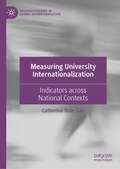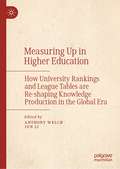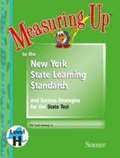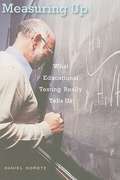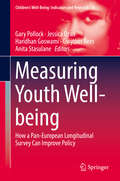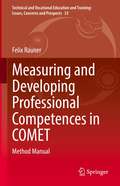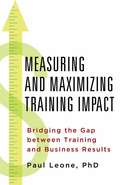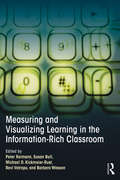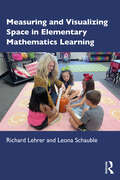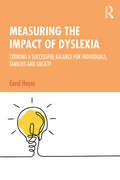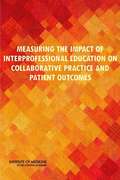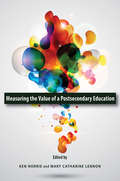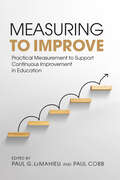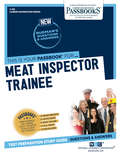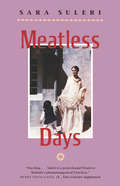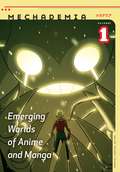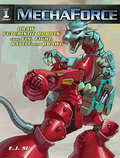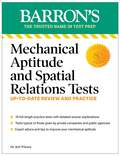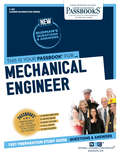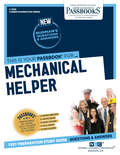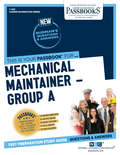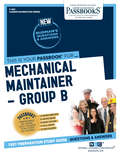- Table View
- List View
Measuring University Internationalization: Indicators across National Contexts (Palgrave Studies in Global Higher Education)
by Catherine Yuan GaoThis book investigates university internationalization in different national contexts and compares internationalization performance across national boundaries. Internationalization has been recognised by policymakers as the key to perform successfully within the new global context: the author identifies primary motivations for universities to embrace this agenda, and deconstructs the phenomenon into measurable dimensions and components. Using extensive qualitative data from university leaders and practitioners, this book analyses the global forces that shape the international education landscape, and reviews the existing instruments for measuring internationalization. In doing so, the author proposes an integrated understanding of university internationalization and indicates benchmarks that can help to quantify and measure this phenomenon. This book will be of interest and value to students and scholars of university internationalization.
Measuring Up in Higher Education: How University Rankings and League Tables are Re-shaping Knowledge Production in the Global Era
by Anthony Welch Jun LiThis book examines the quality assessment movement in academic scholarship, as globalization prompts a search for global measures of university services and output. It gauges productivity in terms of universal publication metrics, and considers ranking and research productivity from a comparative perspective. The book considers the use of the “impact factor” as a gauge of publication value, noting that this less important in countries lacking central government appropriations to universities and to research. It argues that pressure to publish in certain journals, and to research topics of interest to English language readers, has been felt differentially in English-language systems, compared to others, but also that performance pressures fall more on younger, more juniour, contract staff, than on senior and tenured professors. It problematizes international comparisons of quality, and analyses the benefits of a zone of ideas and metrics in a common language – promoting international mobility, efficiency, collaboration - but also the costs which are rarely borne equally across countries, languages and cultures. The book provides a strong, evidence-based contribution to major debates in contemporary higher education reforms and the measurement of academic output.
Measuring Up to the English I End-of-Course Exam, Texas STAAR Edition
by Peoples Education"The lessons in this English I worktext are geared towards helping you master the TEKS so that you are well prepared for the Texas STAAR End-of-Course exam. EOC English I
Measuring Up to the New York State Learning Standards and Success Strategies for the State Test: Science, Level H, Grade 8 (Measuring Up)
by Peoples Education Staff<p>Measuring Up to the New York State Learning Standards and Success Strategies for the State Test (Level H-Science). <p>This book is customized for New York and the lessons match the New York State Learning Standards. The Measuring Up program includes comprehensive worktexts and New York Diagnostic Practice Tests, which are available separately. <p>This worktext is customized to the New York Intermediate Science Core Curriculum and will help you prepare for the New York State Evaluation Test in Science for Grade 8.</p>
Measuring Up: What Educational Testing Really Tells Us
by Daniel KoretzMeasuring Up demystifies educational testing - from MCAS to SAT to WAIS. Bringing statistical terms down to earth, Koretz takes readers through the most fundamental issues that arise in educational testing and shows how they apply to some of the most controversial issues in education today, from high-stakes testing
Measuring Youth Well-being: How A Pan-european Longitudinal Survey Can Improve Policy (Children's Well-being: Indicators and Research Ser. #19)
by Gwyther Rees Gary Pollock Jessica Ozan Haridhan Goswami Anita StasulaneThis volume presents key findings from the EU funded Measuring Youth Well-being (MYWeB) project which assessed the feasibility of a European Longitudinal Study for Children and Young People (ELSCYP). It draws on the original empirical data from a panel of experts in the field of child well-being as well as field experiences from a number of European countries. MYWeB explored strategies and methodological challenges for involving children and young people in well-being research in order to fight poverty and social exclusion. It does so by evaluating different options to measure the well-being of children and young people across Europe using a child centric approach.Written by experts researching children and young people from a variety of disciplinary backgrounds in the areas of sociology, psychology, political science, education, philosophy, economics, social policy, and evaluation.
Measuring and Developing Professional Competences in COMET: Method Manual (Technical and Vocational Education and Training: Issues, Concerns and Prospects #33)
by Felix RaunerThis book is a detailed manual for the implementation of competence diagnostics in the field of vocational training. With the COMET competence model, both conceptual competences as well as practical skills are recorded and evaluated. The manual guides through all methodological steps, including the preparation and implementation of tests, cross and longitudinal studies, the development of context analyses and measurement methods for the test motivation. The focus of the final chapter is the application of the COMET procedure for the design, organisation and evaluation of vocational education and training processes.
Measuring and Maximizing Training Impact
by Paul LeoneThis book shows trainers how to create building blocks, construct the right linkages, and measure the impact of training programs from the first step (Level 1 - reaction) to the final destination (Level 5 - ROI). Including a new ground-breaking Level 6 exploring training sustainability, this is a must-read for HR professionals.
Measuring and Visualizing Learning in the Information-Rich Classroom
by Peter Reimann Barbara Wasson Michael Kickmeier-Rust Ravi Vatrapu Susan BullIntegrated information systems are increasingly used in schools, and the advent of the technology-rich classroom requires a new degree of ongoing classroom assessment. Able to track web searches, resources used, task completion time, and a variety of other classroom behaviors, technology-rich classrooms offer a wealth of potential information about teaching and learning. This information can be used to track student progress in languages, STEM, and in 21st Century skills, for instance. However, despite these changes, there has been little change in the kind of data made available to teachers, administrators, students, and parents. Measuring and Visualizing Learning in the Information-Rich Classroom collects research on the implementation of classroom assessment techniques in technology-enhanced learning environments. Building on research conducted by a multinational and multidisciplinary team of learning technology experts, and specialists from around the globe, this book addresses these discrepancies. With contributions from major researchers in education technology, testing and assessment, and education psychology, this book contributes to a holistic approach for building the information infrastructure of the 21st Century school.
Measuring and Visualizing Space in Elementary Mathematics Learning
by Richard Lehrer Leona SchaubleMeasuring and Visualizing Space in Elementary Mathematics Learning explores the development of elementary students’ understanding of the mathematics of measure, and demonstrates how measurement can serve as an anchor for supporting a deeper understanding of number operations and rational numbers. The concept of measurement is centrally implicated in a number of mathematical operations, yet is not often given the placement it deserves in the elementary mathematics curriculum. By drawing on K-5 classroom research, authors Lehrer and Schauble have been able to articulate a learning progression that describes benchmarks of student learning about measure in length, angle, area, volume, and rational number, exploring related concepts, classroom experiences, and instructional practices at each stage. Offering a unique, research driven resource for helping students develop a deep understanding of measurement to further enhance mathematical understanding, as well as further learning in other STEM disciplines; the book will be relevant for scholars, teacher educators, and specialists in math education. The book is accompanied by online resources developed for practitioners, including instructional guides, examples of student thinking, and other teacher-focused materials, helping clarify how to bring concepts of measure and rational number to life in classrooms.
Measuring the Impact of Dyslexia: Striking a Successful Balance for Individuals, Families and Society
by Carol HayesMeasuring the Impact of Dyslexia shows the considerable benefits of recognising and celebrating the skills of those with information processing differences, explains their unique brain organisation and shows how they can excel as contributing members of society with proper support and guidance. It offers a balanced and research-based perspective to living with this condition, highlighting the huge number of children leaving school with low literacy levels, as a result of undiagnosed information processing differences. Full of critically reflective questions, case studies and interviews with those affected by dyslexia, this text encourages educators of children and young people with dyslexia to challenge their own perceptions by understanding the links between low literacy and anti-social behaviour, poor health, unemployment and limited educational attainment, and includes helpful pointers for improving practice and outcomes. This accessible and readable text is aimed at students, practitioners, researchers and experienced professionals in a range of disciplines to enhance CPD. It is particularly relevant for students working on both taught and research based masters degrees, especially programmes related to specific learning difficulties.
Measuring the Impact of Interprofessional Education on Collaborative Practice and Patient Outcomes
by Committee on Measuring the Impact of Interprofessional Education on Collaborative Practice Patient OutcomesInterprofessional teamwork and collaborative practice are emerging as key elements of efficient and productive work in promoting health and treating patients. The vision for these collaborations is one where different health and/or social professionals share a team identity and work closely together to solve problems and improve delivery of care. Although the value of interprofessional education (IPE) has been embraced around the world - particularly for its impact on learning - many in leadership positions have questioned how IPE affects patent, population, and health system outcomes. This question cannot be fully answered without well-designed studies, and these studies cannot be conducted without an understanding of the methods and measurements needed to conduct such an analysis. This Institute of Medicine report examines ways to measure the impacts of IPE on collaborative practice and health and system outcomes. According to this report, it is possible to link the learning process with downstream person or population directed outcomes through thoughtful, well-designed studies of the association between IPE and collaborative behavior. "Measuring the Impact of Interprofessional Education on Collaborative Practice and Patient Outcomes" describes the research needed to strengthen the evidence base for IPE outcomes. Additionally, this report presents a conceptual model for evaluating IPE that could be adapted to particular settings in which it is applied. "Measuring the Impact of Interprofessional Education on Collaborative Practice and Patient Outcomes" addresses the current lack of broadly applicable measures of collaborative behavior and makes recommendations for resource commitments from interprofessional stakeholders, funders, and policy makers to advance the study of IPE.
Measuring the Value of a Postsecondary Education
by Ken Norrie Mary Catharine LennonMeasuring the Value of a Postsecondary Education is an insightful collection of essays that respond to current and pressing questions in the field of higher education: What do we mean by "quality" of education? What do courses and programs promise to deliver, and do they succeed? What do we know about improving learning outcomes, and is reform possible? Comprised of papers presented at a conference of experts convened by the Higher Education Quality Council of Ontario in 2011, the book begins by evaluating pioneering initiatives in Europe, and follows this with reports on efforts to measure and evaluate learning outcomes. Drawing on over two decades of work by international agencies, governments, and foundations in identifying and evaluating learning outcomes in higher education, Measuring the Value of a Postsecondary Education encourages educational institutions to draw on this evidence in revising course and program offerings. Bringing together international leaders and innovators in the field, this book is an important analysis of progress in enhancing learning quality and directions for future reform. Contributors include Jeana Abromeit (Alverno College), Roger Benjamin (Council for Aid to Education), Ken Dryden (Canadian politician), Michael Gallagher (Group of Eight), Virginia Hatchette (Postsecondary Education Quality Assessment Board), Jillian Kinzie (Indiana University), Diane Lalancette (Organisation for Economic Co-operation and Development), Holiday Hart McKiernan (Lumina Foundation), Robert Wagenaar (University of Groningen), and Lorne A. Whitehead (University of British Columbia).
Measuring the Value of a Postsecondary Education (Queen's Policy Studies Series #162)
by Ken Norrie Mary Catharine LennonMeasuring the Value of a Postsecondary Education is an insightful collection of essays that respond to current and pressing questions in the field of higher education: What do we mean by "quality" of education? What do courses and programs promise to deliver, and do they succeed? What do we know about improving learning outcomes, and is reform possible? Comprised of papers presented at a conference of experts convened by the Higher Education Quality Council of Ontario in 2011, the book begins by evaluating pioneering initiatives in Europe, and follows this with reports on efforts to measure and evaluate learning outcomes. Drawing on over two decades of work by international agencies, governments, and foundations in identifying and evaluating learning outcomes in higher education, Measuring the Value of a Postsecondary Education encourages educational institutions to draw on this evidence in revising course and program offerings. Bringing together international leaders and innovators in the field, this book is an important analysis of progress in enhancing learning quality and directions for future reform. Contributors include Jeana Abromeit (Alverno College), Roger Benjamin (Council for Aid to Education), Ken Dryden (Canadian politician), Michael Gallagher (Group of Eight), Virginia Hatchette (Postsecondary Education Quality Assessment Board), Jillian Kinzie (Indiana University), Diane Lalancette (Organisation for Economic Co-operation and Development), Holiday Hart McKiernan (Lumina Foundation), Robert Wagenaar (University of Groningen), and Lorne A. Whitehead (University of British Columbia).
Measuring to Improve: Practical Measurement to Support Continuous Improvement in Education (Continuous Improvement in Education Series)
by Paul Cobb Paul G. LeMahieuA first-in-field compilation of best practices for the design and implementation of practical measurement for improvement in K-12 education
Meat Inspector Trainee: Passbooks Study Guide (Career Examination Series)
by National Learning CorporationThe Meat Inspector Trainee Passbook® prepares you for your test by allowing you to take practice exams in the subjects you need to study. It provides hundreds of questions and answers in the areas that will likely be covered on your upcoming exam, including but not limited to; Meat and food inspection; Supervision; Supervision; Verbal abilities; Understanding and interpreting written materials; Abstract reasoning; and more.
Meatless Days
by Sara SuleriIn this finely wrought memoir of life in postcolonial Pakistan, Suleri intertwines the violent history of Pakistan's independence with her own most intimate memories--of her Welsh mother; of her Pakistani father, prominent political journalist Z. A. Suleri; of her tenacious grandmother Dadi and five siblings; and of her own passage to the West. "Nine autobiographical tales that move easily back and forth among Pakistan, Britain, and the United States. . . . She forays lightly into Pakistani history, and deeply into the history of her family and friends. . . . The Suleri women at home in Pakistan make this book sing. "--Daniel Wolfe,New York Times Book Review "A jewel of insight and beauty. . . . Suleri's voice has the same authority when she speaks about Pakistani politics as it does in her literary interludes. "--Rone Tempest, Los Angeles Times Book Review "The author has a gift for rendering her family with a few, deft strokes, turning them out as whole and complete as eggs. "--Anita Desai, Washington Post Book World "Meatless Daystakes the reader through a Third World that will surprise and confound him even as it records the author's similar perplexities while coming to terms with the West. Those voyages Suleri narrates in great strings of words and images so rich that they left this reader . . . hungering for more. "--Ron Grossman, Chicago Tribune "Dazzling. . . . Suleri is a postcolonial Proust to Rushdie's phantasmagorical Pynchon. "--Henry Louise Gates, Jr. ,Voice Literary Supplement
Meatless Days
by Sara SuleriIn this finely wrought memoir of life in postcolonial Pakistan, Suleri intertwines the violent history of Pakistan's independence with her own most intimate memories of her Welsh mother; of her Pakistani father, prominent political journalist Z. A. Suleri; of her tenacious grandmother Dadi and five siblings; and of her own passage to the West. "Nine autobiographical tales that move easily back and forth among Pakistan, Britain, and the United States. . . . She forays lightly into Pakistani history, and deeplyinto the history of her family and friends. . . . The Suleri women at home in Pakistan make this book sing. " Daniel Wolfe, "New York Times Book Review" "A jewel of insight and beauty. . . . Suleri's voice has the same authority when she speaks about Pakistani politics as it does in her literary interludes. " Rone Tempest, "Los Angeles Times Book Review" "The author has a gift for rendering her family with a few, deft strokes, turning them out as whole and complete as eggs. " Anita Desai, "Washington Post Book World" ""Meatless Days" takes the reader through a Third World that will surprise and confound him even as it records the author's similar perplexities while coming to terms with the West. Those voyages Suleri narrates in great strings of words and images so rich that they left this reader . . . hungering for more. " Ron Grossman, "Chicago Tribune" "Dazzling. . . . Suleri is a postcolonial Proust to Rushdie's phantasmagorical Pynchon. " Henry Louise Gates, Jr. , "Voice Literary Supplement""
Mechademia 1: Emerging Worlds of Anime and Manga
by Frenchy LunningAfter decades in which American popular culture dominated global media and markets, Japanese popular culture—primarily manga and anime, but also toys, card and video games, and fashion—has exploded into a worldwide phenomenon. From Pokémon and the Power Rangers to Paranoia Agent and Princess Mononoke, Japanese popular culture is consumed by an eager and exponentially increasing audience of youths, teenagers, and adults. Mechademia, a new annual edited by Frenchy Lunning, begins an innovative and fresh conversation among scholars, critics, and fans about the complexity of art forms like Superflat, manga, and anime. The inaugural volume, Mechademia 1 engages the rise of Japanese popular culture through game design, fashion, graphic design, commercial packaging, character creation, and fan culture. Promoting dynamic ways of thinking, along with state-of-the-art graphic design and a wealth of images, this cutting-edge work opens new doors between academia and fandom.The premiere issue features the interactive worlds that anime and manga have created, including the origins of cosplay (the manga and anime costume subculture), Superflat, forgotten images from a founding manga artist, video game interactivity, the nature of anime fandom in America, and the globalization of manga. Contributors: Anne Allison, Duke U; William L. Benzon; Christopher Bolton, Williams College; Vern L. Bullough, California State U, Northridge; Martha Cornog; Patrick Drazen; Marc Hairston; Mari Kotani; Thomas LaMarre; Antonia Levi, Portland State U; Thomas Looser, NYU; Susan Napier, U of Texas, Austin; Michelle Ollie; Timothy Perper; Sara Pocock; Brian Ruh; Takayuki Tatsumi, Keio U, Tokyo; Toshiya Ueno, Wako U, Tokyo; Theresa Winge, U of Northern Iowa; Mark J. P. Wolf, Concordia U; Wendy Siuyi Wong, York U.Frenchy Lunning is professor of liberal arts at the Minneapolis College of Art and Design.
Mechaforce: Draw Futuristic Robots That Fly, Fight, Battle And Brawl
by E J SuDraw Futuristic Robots that Fly, Fight, Battle and BrawlWhen it comes to drawing robots, beauty is more than skin deep - try armor deep. Slick surfaces and fancy mechanics aren't enough ... success depends on what makes your robot tick and MechaForce gears your imagination into overdrive!33 step-by-step demonstrations show you how to render original, memorable robots, and bring them to life on the page. Learn how to:Draw believable humanoid robots by using tubes, pipes, nuts, bolts, hydraulics and other machinery in place of muscles and bones.Model robots after horses, spiders, dragons and other creatures.Give your robots personality, from sleek and athletic to thin, comical or feminine.Evoke an in-your-face sense of drama and action with extreme perspectives and different poses.Achieve the realistic look of reflective surfaces and other robotic textures.Compose dynamic scenes and establish moods with lighting.Don't short-circuit your robo-creations. From the basics of drawing to dynamic battle scenes, MechaForce will help you create devastating robots with a no-holds-barred attitude!
Mechanical Aptitude and Spatial Relations Tests, Fourth Edition (Barron's Test Prep)
by Joel WiesenBe prepared for exam day with Barron&’s. Trusted content from a mechanical aptitude and spatial relations expert!Barron&’s Mechanical Aptitude and Spatial Relations Tests includes in-depth content review and practice. It&’s the only book you&’ll need to be prepared for exam day. Written by an Experienced Educator and nationally known testing expert. Learn from Barron&’s--all content is written and reviewed by the author.Build your understanding with comprehensive review tailored to the most recent written mechanical and spatial relations testsGet a leg up with tips, strategies, and study advice for exam day--it&’s like having a trusted tutor by your side Be Confident on Exam DaySharpen your test-taking skills with 18 typical tests that gauge an individual&’s mechanical aptitude and spatial ability, with all questions answered and explained.Strengthen your knowledge with in-depth review covering all topics for each test that help screen applicants for jobs that range from mechanics and skilled trades apprentices to aerospace engineers and firefighters. These tests often differ in detail but measure similar abilities.Reinforce your learning with hundreds of practice questions covering all tested topics.Deepen your understanding with expert advice on ways to improve mechanical comprehension, test-taking tips, and explanations on how pulleys, levers, and other simple machines work. The book is also contains hundreds of helpful diagrams and illustrations.
Mechanical Engineer: Passbooks Study Guide (Career Examination Series #No. Q-83)
by National Learning CorporationThe Mechanical Engineer Passbook® prepares you for your test by allowing you to take practice exams in the subjects you need to study. It provides hundreds of questions and answers in the areas that will likely be covered on your upcoming exam.
Mechanical Helper: Passbooks Study Guide (Career Examination Series)
by National Learning CorporationThe Mechanical Helper Passbook® prepares you for your test by allowing you to take practice exams in the subjects you need to study. It provides hundreds of questions and answers in the areas that will likely be covered on your upcoming exam, including but not limited to: use and function of tools and equipment commonly used in the mechanical trades; reading and interpreting drawings of mechanical objects such as pulleys and gears; shop safety; following written directions; basic arithmetic; and more.
Mechanical Maintainer – Group A: Passbooks Study Guide (Career Examination Series)
by National Learning CorporationThe Mechanical Maintainer – Group A Passbook® prepares you for your test by allowing you to take practice exams in the subjects you need to study. It provides hundreds of questions and answers in the areas that will likely be covered on your upcoming exam, including but not limited to: mechanical and electrical fundamentals; first aid; arithmetical reasoning including use of charts and diagrams; and more.
Mechanical Maintainer – Group B: Passbooks Study Guide (Career Examination Series #C-484)
by National Learning CorporationThe Mechanical Maintainer – Group B Passbook® prepares you for your test by allowing you to take practice exams in the subjects you need to study. It provides hundreds of questions and answers in the areas that will likely be covered on your upcoming exam, including but not limited to: Knowledge of basic tools and machines used in repair, maintenance, inspection and alteration of elevators and escalators; Trouble-shoot and locate electrical faults; Repair and replacement of elevator and escalator components; and more.
